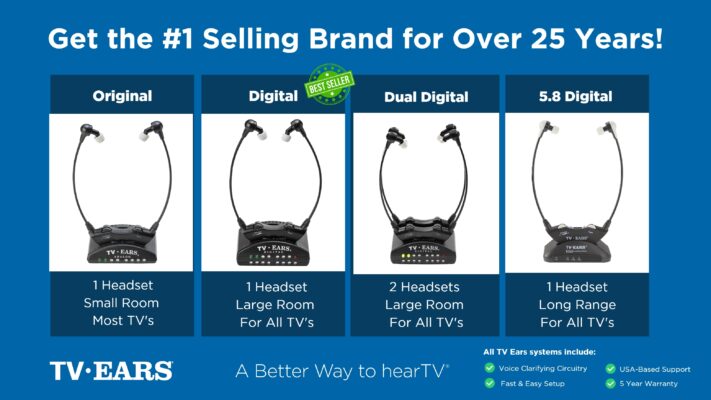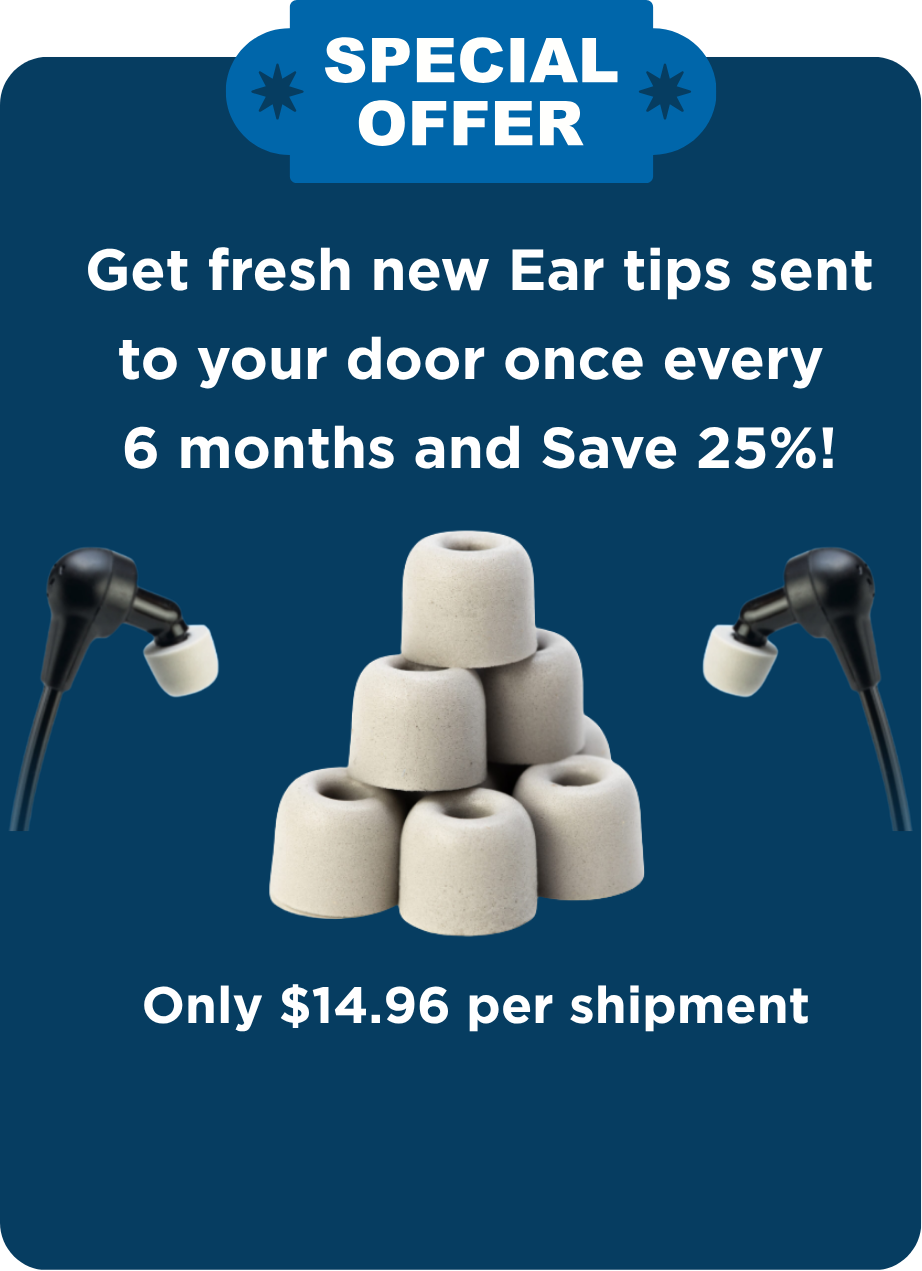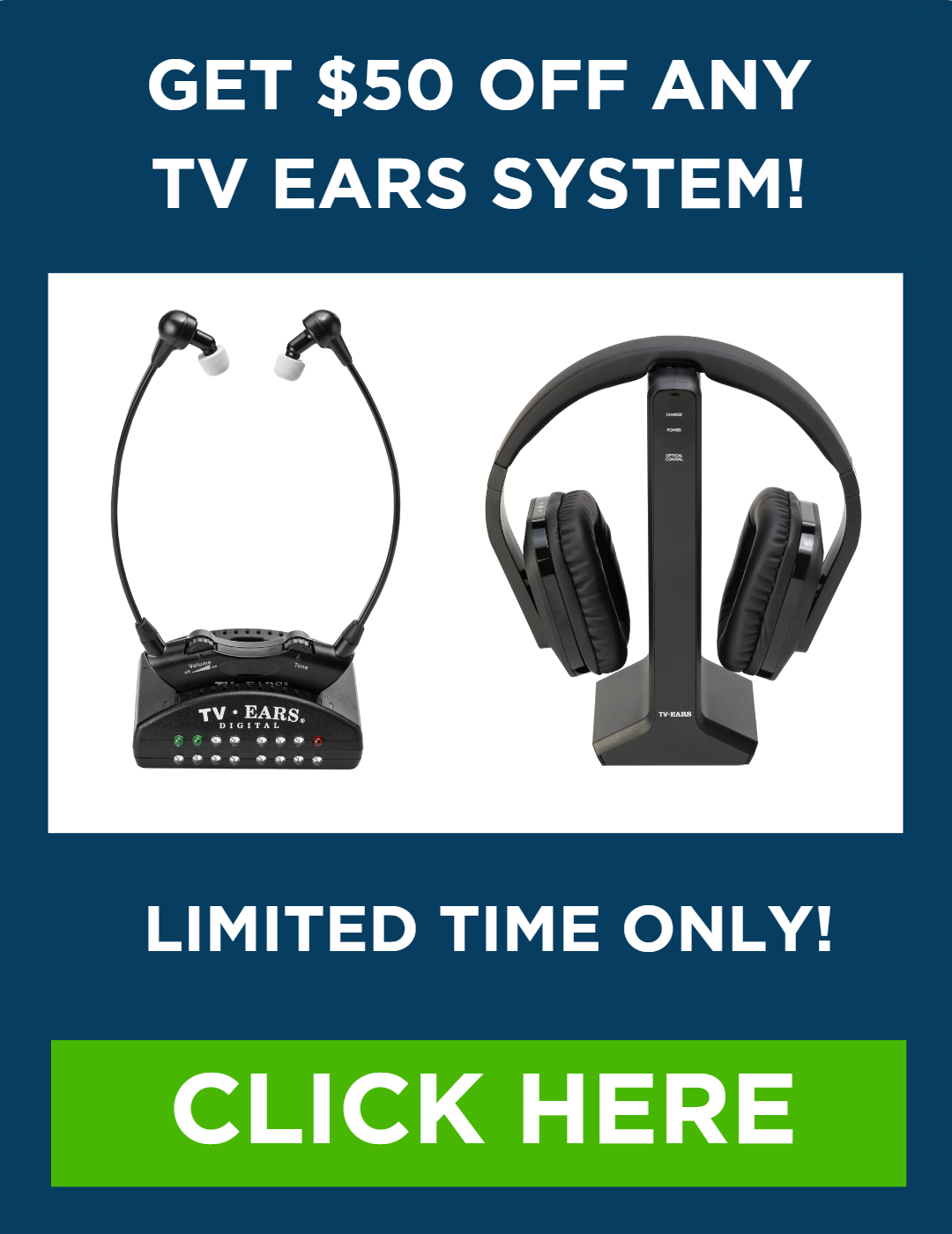You have a whole toolbox for home repairs because you know that the right tool makes any job easier. The same logic applies to hearing solutions. While a general-purpose tool is useful, sometimes you need something specialized for a specific task. Many people begin their search for the best non prescription hearing aids hoping for a single device that fixes everything. But if your primary frustration is muffled dialogue and loud background music on TV, a general amplifier might not be the most effective tool. This guide will explain the difference between all-purpose OTC aids and voice-clarifying TV listening systems, helping you choose the right solution for the job.
Finally Hear Your TV Clearly Without a Prescription
 For those facing hearing difficulties, finding a solution that allows clear TV audio with hearing aids non prescription can be a game-changer. TV Ears, the leading brand in innovative audio solutions, offers a fantastic alternative that brings back the joy of watching television with crystal-clear sound. With TV Ears, you can once again enjoy your favorite shows without disturbing others and without the hassle of prescription hearing aids. Let’s dive into how TV Ears can revolutionize your TV watching experience! TV Ears understands the frustration of struggling to hear TV dialogue, missing out on important plot details, or constantly asking others to repeat themselves. With their cutting-edge technology, TV Ears provides an effective solution for clear TV audio without any other hearing aids non prescription. Their systems amplify the sound, bringing the dialogue and sound effects to life with exceptional clarity. Say goodbye to straining to hear and immerse yourself in the audio experience like never before!
For those facing hearing difficulties, finding a solution that allows clear TV audio with hearing aids non prescription can be a game-changer. TV Ears, the leading brand in innovative audio solutions, offers a fantastic alternative that brings back the joy of watching television with crystal-clear sound. With TV Ears, you can once again enjoy your favorite shows without disturbing others and without the hassle of prescription hearing aids. Let’s dive into how TV Ears can revolutionize your TV watching experience! TV Ears understands the frustration of struggling to hear TV dialogue, missing out on important plot details, or constantly asking others to repeat themselves. With their cutting-edge technology, TV Ears provides an effective solution for clear TV audio without any other hearing aids non prescription. Their systems amplify the sound, bringing the dialogue and sound effects to life with exceptional clarity. Say goodbye to straining to hear and immerse yourself in the audio experience like never before!
What Are Over-the-Counter (OTC) Hearing Aids?
Over-the-counter (OTC) hearing aids are a category of devices made for adults who feel they have mild to moderate hearing loss. You can think of them like the reading glasses you might pick up at a pharmacy. You can buy them directly online or in a store without needing a doctor’s exam or a prescription. This accessibility makes them a great first step for anyone just starting to notice a change in their hearing. While they are designed to amplify sounds in general, they may not be the perfect fix for every situation. For a specific challenge, like clearly understanding dialogue on television, a specialized device like TV Ears can be a more direct and effective tool, since it’s engineered specifically to clarify TV audio.
Who They Are For
OTC hearing aids are designed for adults over 18 who perceive their hearing loss as mild to moderate. If you find yourself often asking people to speak up or you’re constantly reaching for the volume remote, you might fit into this group. However, it’s important to know they aren’t a universal solution. These devices are not meant for children or for adults with severe hearing loss. If you struggle to follow conversations even in quiet settings or experience a sudden change in your hearing, it’s best to see a hearing healthcare professional. An audiologist can give you a proper diagnosis and guide you toward a more personalized solution, like a prescription hearing aid.
Health Risks of Untreated Hearing Loss
Choosing to ignore hearing loss can affect more than just your ability to follow a conversation. Research has shown that leaving hearing loss untreated can have serious consequences for your overall health. It can increase the risk of cognitive decline and dementia, and it often leads to feelings of depression and social isolation when engaging with others becomes too challenging. The constant strain of trying to hear can also impact physical health, with studies connecting it to a higher risk of falls and even heart attacks. Taking a proactive step—whether that’s trying an OTC device for daily use or using a TV listening system to enjoy your favorite shows—is a crucial part of protecting your long-term well-being.
Why TV Ears Are a Simpler Choice Than Hearing Aids
Prescription hearing aids often involve lengthy appointments, complicated adjustments, and significant costs. TV Ears offers a non-prescription alternative that is both convenient and user-friendly. Their devices are ready to use right out of the box, eliminating the need for appointments or custom fittings. With TV Ears, you can simply plug in and enjoy enhanced TV audio within minutes. One of the remarkable advantages of TV Ears is that it not only benefits those with hearing difficulties but also provides an enhanced TV experience for everyone in the room. With TV Ears, you can set your preferred volume without disturbing others. Whether you enjoy watching TV alone or with family and friends, TV Ears ensures that everyone can enjoy the show at their desired volume, without compromising on audio clarity. TV Ears systems are designed with simplicity in mind. The setup process is straightforward, and the devices are compatible with most TVs, making them accessible to a wide range of users. Whether you prefer wireless headsets or lightweight earbuds, TV Ears offers versatile options to suit your personal preferences. Their devices are comfortable to wear and provide hours of uninterrupted TV enjoyment. And TV Ears stands out for its unbeatable value. Compared to prescription hearing aids, TV Ears devices are affordable and offer exceptional performance. You can regain the ability to hear TV clearly without breaking the bank. TV Ears believes that everyone deserves access to high-quality audio solutions, and they have made it their mission to provide cost-effective options for all. Say goodbye to the frustration of unclear TV audio and the inconvenience of hearing aids non prescription. TV Ears offers an outstanding alternative that restores your ability to hear TV clearly, without disturbing others. With their user-friendly devices, simple setup, and unbeatable value, TV Ears is the ultimate solution for a more enjoyable TV watching experience. Visit the TV Ears website at www.tvears.com to explore their range of products and take the first step toward rediscovering the joy of television. Call to Action: Ready to enhance your TV audio experience? Visit www.tvears.com today and embark on a journey of clear, immersive TV watching with TV Ears. Don’t miss out on the excitement – find your perfect TV Ears solution now for watching TV without any other hearing aids non prescription.
Ready for Clearer TV Sound? Explore Our top-rated, audiologist-designed systems that can help, find more at www.tvears.com.

Looking for more? Check out the recent stories on the TV Ears blog:
Crackling sounds in ears? 6 possible causes
TV speaker for hard of hearing? There may be a better option
Affordable hearing aids? Trust the best-selling brand since 1998s
The Basics of Hearing Aids Repair: Regaining Sound Quality
Does Tinnitus Go Away? Understanding its Impact on TV Watching
Hearing aids evaluation: What you should know
When a Specialized Device is the Right Fit
Over-the-counter (OTC) hearing aids are designed for adults who experience mild to moderate hearing loss. You can buy them online or in stores without a prescription, making them a convenient option for general hearing support. However, sometimes the problem isn’t about hearing everything better—it’s about hearing one specific thing clearly. If your main struggle is understanding dialogue on television, a specialized device might be a more direct and effective solution. These devices are engineered specifically to tackle the unique audio challenges of TV sound, like separating speech from loud background music and sound effects, which is a common frustration that general hearing aids may not fully resolve.
How TV Ears Clarifies Television Audio
Instead of amplifying all the sounds around you, TV Ears focuses solely on the audio coming from your television. Our systems use Voice Clarifying Circuitry® to lift dialogue out of the background noise, making words sharp and understandable. As our team explains, TV Ears provides an effective solution for clear TV audio by amplifying and clarifying the sound, bringing dialogue and sound effects to life with exceptional clarity. This means you can catch every whisper and punchline without cranking up the volume for the entire room. It’s a simple, targeted approach that solves the specific problem of hearing the TV, allowing for a peaceful and enjoyable viewing experience for everyone.
How to Choose and Buy OTC Hearing Aids
If you’ve determined that a general hearing aid is the right path for you, the next step is figuring out how to choose the best OTC device for your needs. With so many options available, it can feel a bit overwhelming. The key is to approach it systematically by focusing on a few important factors. From getting a baseline hearing test to understanding the features that matter most to you, a little research can go a long way. You’ll also want to pay close attention to trial periods and warranties, as these can protect your investment. Finally, knowing where to shop can help you find the best deals and support for your new device.
Get a Hearing Test First
Even though a prescription isn’t required for OTC hearing aids, starting with a professional hearing test is a smart move. An audiologist can determine the specific degree and type of your hearing loss, which is valuable information to have. This insight helps confirm if you are a good candidate for an OTC device or if your hearing loss requires a prescription-level solution. An initial test provides a clear baseline, ensuring you choose a product that is genuinely suited to your hearing needs rather than just guessing. It empowers you to make a more informed and confident purchase.
Consider Key Features and Styles
When comparing different OTC hearing aids, think about the features that will fit your lifestyle. Do you prefer rechargeable batteries for convenience, or are you okay with disposable ones? Many modern devices connect to a smartphone app for easy customization, which is great for tech-savvy users but might be a hurdle for others. You should also consider the style—some are nearly invisible, while others sit behind the ear. Thinking through these practical details will help you narrow down the options to a device that you’ll be comfortable and happy using every day.
Look for Strong Trial Periods and Warranties
Adjusting to hearing aids takes time, so a generous trial period is essential. Look for brands that offer at least a 45-day trial, though some, like Jabra Enhance, provide up to 100 days. This gives you ample time to test the devices in different environments—from quiet conversations at home to busier settings—and decide if they’re the right fit. A solid warranty is just as important, as it protects you from defects and potential repair costs. These policies show that a company stands behind its product and gives you the peace of mind to try a new device without risk.
Where to Buy OTC Hearing Aids
One of the biggest advantages of OTC hearing aids is their accessibility. You no longer need to go through a specialized clinic to purchase them. These devices are widely available from various retailers, giving you the flexibility to shop where you feel most comfortable. You can buy them directly from the manufacturer’s website, which often provides detailed information and customer support. They are also sold at major retail stores like Best Buy and Walmart, as well as pharmacies such as Walgreens and CVS, allowing you to see the products in person before making a decision.
Top-Rated OTC Hearing Aid Brands
The market for OTC hearing aids has grown quickly, with several reputable brands offering high-quality devices. Companies like Jabra Enhance and Lexie (powered by Bose) have become popular for their blend of performance, user-friendly features, and strong customer support. Other brands, like Eargo, focus on discreet, nearly invisible designs, while Audien offers some of the most affordable options available. Major electronics companies like Sony and Sennheiser have also entered the space, bringing their audio expertise to the hearing health world. Each brand has its own strengths, so it’s helpful to compare them based on what matters most to you, whether it’s sound quality, invisibility, price, or customer service.
Jabra Enhance
Jabra Enhance is frequently highlighted as a top overall choice in the OTC market. These devices are known for their excellent sound quality and a long-lasting rechargeable battery that offers up to 30 hours of use on a single charge. They also feature Bluetooth connectivity, allowing you to stream music and take calls directly through your hearing aids. What really sets them apart for many users is the generous 100-day trial period, which provides plenty of time to ensure they are the right fit. This combination of premium features and a customer-friendly policy makes them a leading contender for those with mild to moderate hearing loss.
Eargo
For those who prioritize discretion, Eargo is often the go-to brand. Their hearing aids are designed to be completely-in-canal (CIC), making them virtually invisible when worn. Despite their tiny size, they deliver impressive sound quality and are designed for comfort. A standout feature of Eargo is the lifetime support from their team of hearing professionals, which gives users ongoing access to expert advice and adjustments. This focus on a discreet design combined with robust, long-term support makes Eargo a compelling option for anyone who feels self-conscious about wearing a hearing aid but still wants a high-performance device.
Lexie (Powered by Bose)
Lexie offers a fantastic balance of performance and price, making it a top “best value” pick. Powered by Bose’s renowned audio technology, these hearing aids deliver quality sound with features that are easy to manage. Users can customize their settings through an intuitive smartphone app, which also provides access to real-time support from hearing experts. Lexie devices are Bluetooth-enabled, allowing for hands-free calling and other convenient features. By combining Bose’s audio engineering with strong customer support and an affordable price point, Lexie has carved out a strong reputation in the OTC hearing aid market.
Audien
If budget is your primary concern, Audien is a brand worth looking into. They are known for offering some of the most affordable hearing aids on the market, with prices starting at a fraction of what many other brands charge. While they may not have all the advanced features of more expensive models, they provide basic sound amplification that can make a significant difference for those with mild hearing loss. Audien offers several different models, including some with rechargeable batteries and Bluetooth capabilities, making hearing assistance accessible to a much wider audience without a major financial commitment.
Sony
Leveraging its decades of experience in consumer audio, Sony has entered the OTC hearing aid market with devices co-developed with WS Audiology, a leader in the hearing health industry. The Sony CRE-E10 is a self-fitting, earbud-style device that is praised for being comfortable and easy to use. It features automatic sound adjustments for different environments and offers Bluetooth streaming for audio and calls. With a focus on user-friendly design and reliable performance, Sony provides a familiar and trusted brand name for consumers looking to address their hearing for the first time.
Sennheiser
Sennheiser is another well-respected audio brand that has expanded into hearing solutions with its All-Day Clear hearing aids. These devices are designed for comfort and clarity, offering advanced features like speech enhancement and automatic environment detection. They are rechargeable, Bluetooth-enabled for streaming and calls, and can be controlled via a user-friendly smartphone app. The Sennheiser All-Day Clear is suitable for individuals with mild to moderate hearing loss who want a premium, feature-rich device from a brand known for its commitment to high-quality sound engineering.
Cost and Insurance Coverage
One of the most significant considerations when exploring hearing solutions is the cost. OTC hearing aids have made hearing assistance more accessible, but prices can still vary widely. It’s also important to understand what, if any, of that cost might be covered by your insurance plan. Unfortunately, many traditional insurance policies, including Medicare, have historically offered limited or no coverage for hearing aids, though this is slowly beginning to change with some private Medicare Advantage plans. Knowing the typical price range and checking your specific insurance benefits ahead of time can help you budget properly and avoid any financial surprises down the road.
Price Range for OTC Hearing Aids
The cost of OTC hearing aids can range significantly, from around $100 for very basic models to over $2,000 for devices with advanced features. The price typically reflects the technology inside—more expensive models often include features like Bluetooth connectivity, rechargeable batteries, and sophisticated noise reduction and speech-clarifying algorithms. Simpler, more affordable devices may only offer basic amplification. This wide range means there is likely an option available for most budgets, but it’s important to balance cost with the features you need for an effective and comfortable listening experience.
Understanding Insurance and Medicare Coverage
Navigating insurance coverage for hearing aids can be tricky. As a general rule, Original Medicare (Parts A and B) does not cover hearing aids or the exams for fitting them. This is a major reason why many people seek out more affordable OTC options. However, some private insurance plans or Medicare Advantage (Part C) plans may offer benefits that include a partial or full allowance for hearing aids. It is always best to call your insurance provider directly to ask about your specific plan’s coverage for hearing devices before making a purchase.
Expert and Consumer Perspectives
When making a decision about hearing health, it’s helpful to consider insights from both professionals and everyday users. Audiologists can provide a clinical perspective on who benefits most from OTC devices and what to look for from a technical standpoint. At the same time, consumer reviews and surveys reveal what features people actually use and value in their day-to-day lives. Looking at both sides gives you a well-rounded picture, helping you match expert recommendations with real-world practicality. This ensures you choose a solution that is not only effective but also enjoyable to use.
What Audiologists Recommend
Many audiologists see the value in OTC hearing aids as a way to make hearing help more accessible. They recognize that for many people, factors like cost, lack of insurance coverage, or difficulty getting to a clinic are significant barriers to getting prescription devices. As a result, OTC options provide a crucial entry point for adults with mild to moderate hearing loss who might otherwise go without any help at all. Professionals generally advise starting with a hearing test to confirm your level of hearing loss and recommend choosing a device from a reputable brand that offers strong customer support and a good return policy.
Features Modern Consumers Want
When it comes to what people want in a hearing device, convenience and confidence are key. According to a survey by Wirecutter, an overwhelming majority of users (84%) prioritize a long trial period, as it allows them to test the device in their own environment without risk. Rechargeable batteries are another highly sought-after feature, eliminating the hassle of changing tiny batteries. Finally, users value discreet designs that don’t draw attention and smartphone apps that allow for easy, on-the-fly adjustments. These preferences show that today’s users are looking for effective, user-friendly solutions that fit seamlessly into their lives.
Frequently Asked Questions
What’s the main difference between an OTC hearing aid and a TV listening system? Think of it like having a general-purpose wrench versus a specialized screwdriver. An over-the-counter (OTC) hearing aid is designed to amplify all the sounds around you, which is helpful for general, day-to-day hearing loss. A TV listening system, like TV Ears, is a specialized tool designed for one specific job: clarifying the audio from your television so you can understand dialogue clearly, even when there’s loud background music or sound effects.
My main problem is just hearing the TV. Will a regular OTC hearing aid fix that? It might help, but it may not solve the specific problem. OTC hearing aids amplify everything, including the background music and sound effects that can make TV dialogue hard to understand. A system like TV Ears is engineered to specifically target and lift the frequencies of human speech out of the mix, making words crisp and clear. If your only frustration is with the TV, a specialized device is often a more direct and effective solution.
Do I really need a hearing test before buying one of these? While you don’t need a prescription or a test to buy an OTC hearing aid or a TV listening system, getting a hearing test is a smart first step. It gives you a clear baseline of your hearing health and helps confirm if your hearing loss is mild to moderate, which is what OTC devices are designed for. This information empowers you to make a more informed choice, ensuring you select a product that truly fits your needs.
Can I use TV Ears if I already wear hearing aids? Yes, absolutely. Many people use TV Ears alongside their prescription or OTC hearing aids. You would simply remove your hearing aids and wear the TV Ears headset while watching your favorite shows. This gives your ears a rest and provides a sound experience that is specifically optimized for television, allowing you to hear every word without turning the volume up for everyone else in the room.
Are these devices difficult to set up? Not at all. TV Ears systems are designed to be incredibly straightforward. You can typically set them up in just a few minutes right out of the box. The process usually involves plugging a small transmitter into your television and then you’re ready to use the wireless headset. The goal is to provide a simple, user-friendly solution that doesn’t require technical expertise or complicated adjustments.
Key Takeaways
- Match the Solution to the Problem: General OTC hearing aids amplify all sounds around you. If your main frustration is unclear TV dialogue, a specialized TV listening system is designed specifically to clarify speech and reduce background noise for a better viewing experience.
- Shop for OTC Aids with a Plan: Before buying a general-purpose hearing aid, get a baseline hearing test to confirm it’s the right fit. Prioritize key features like rechargeable batteries and look for brands that offer generous trial periods so you can test the device in your daily life without risk.
- Understand the Costs and Coverage: Don’t let the final price be a surprise. Remember that Original Medicare generally doesn’t cover hearing aids, so it’s best to check directly with your private insurance or Medicare Advantage provider to see what hearing benefits your plan may offer.


